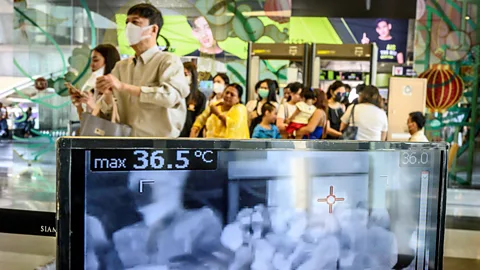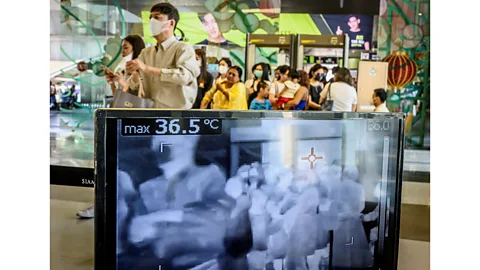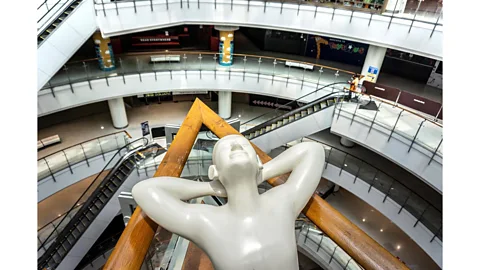January 2020: The scanners used to stop Covid's deadly spread
 Mladen Antonov/ AFP/ Getty Images
Mladen Antonov/ AFP/ Getty ImagesIn January 2020, Thai authorities were amongst the first to have to grapple with a worrying new disease. The frontlines included the country's shopping malls.
In January 2020, a new strain of pneumonia that has been worrying Chinese scientists and doctors suddenly becomes a global problem.
On 13 January, Thailand reports the first case of this new respiratory illness outside China: a 61-year-old resident of the Chinese city of Wuhan who had arrived in Thailand five days before. Slowly, the number of cases reported in Thailand increases.
Within a week, other Asian nations such as Japan and South Korea report cases. Within three weeks, the number of cases rises to the point that the disease became a "public health emergency of international concern" according to the World Health Organization (WHO) on 30 January 2020.
It will become much, much worse.
The gradual spread of the disease starts to attract the attention of the world's media. In Bangkok, Mladen Antonov, a Bulgarian photographer who works for the agency Agence Press (AFP), starts to cover the steadily increasing reaction to the disease.
"Thailand took very early measures," Antonov tells the BBC from his home in Hong Kong in late 2024. "Southeast Asia has a big trauma from previous pandemics, the Sars and all these. So they are very, very cautious about all this."
Antonov says the Thai authorities quickly install body heat monitors in places such as shopping malls. Businesses within the malls, he says, usually pay for the equipment to be installed. The monitors pick up any abnormally high body temperatures, and anyone found to have a fever is reported to the authorities.
"I think it's the 27th of January [when this happens], or something like that. This is just the beginning," says Antonov. "Our job, as journalists for the wire, we had to provide daily [images] of how the world reacts. So I was walking around, going to different places, searching for images to show masks. That was actually what first we start doing, showing pictures with people with masks," he says.
 Mladen Antonov/ AFP/ Getty Images
Mladen Antonov/ AFP/ Getty ImagesAntonov then walks into a shopping mall, and sees the body heat scanner in operation. "It's not easy to work in commercial properties like this, like in shopping malls, you need special permission," he says. "So it was not easy to take the photo. But of course, I didn't ask. I just went and I start shooting them." Antonov has to move behind the thermal camera, which is being operated by two guards, and take a picture of the screen without them noticing.
"It was a challenging time, as you can imagine, for a photographer, because we had to go to hospitals. We had to be outside when people were really afraid, you know, for any you had to go out and even go and push, to go closer," says Antonov.
Thailand is one country that does not adopt the strictest lockdown procedures in early 2020. The thermal cameras soon became a common sight, Antonov says, as people travelled to work or to shop. "They introduced such thermal cameras to every metro station and to bigger shops. They were also using these 'gun thermometers', pointing the guns to your head and measuring the temperature.
"We in the wire business, we cover wars, we cover tragedies, we cover hurricanes, we cover typhoons, we cover earthquakes, things like this," says Antonov. "So this was just another one challenge; yes, very different than anything else that we did previously, but still something were you have to find a way to do it and to be inventive, because it's very repetitive… masks, masks, masks, masks," he says.
 Mladen Antonov/ AFP/ Getty Images
Mladen Antonov/ AFP/ Getty ImagesAround six weeks after the image is taken, Antonov starts to grasp just how serious the situation is. "We were reporting every day from… 200 offices around the world, so we had from everywhere information, we start counting cases, deaths and things like this."
The invisible virus is a very different challenge to the normal threats war photographers face. "Is it deadly? What does it mean to catch it">window._taboola = window._taboola || []; _taboola.push({ mode: 'alternating-thumbnails-a', container: 'taboola-below-article', placement: 'Below Article', target_type: 'mix' });
